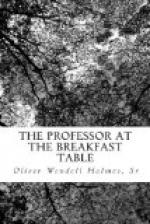—There is something in what you say,—replied the divinity-student; —and yet it seems to me there are places and times where disputed doctrines of religion should not be introduced. You would not attack a church dogma—say Total Depravity—in a lyceum-lecture, for instance?
Certainly not; I should choose another place,—I answered.—But, mind you, at this table I think it is very different. I shall express my ideas on any subject I like. The laws of the lecture-room, to which my friends and myself are always amenable, do not hold here. I shall not often give arguments, but frequently opinions,—I trust with courtesy and propriety, but, at any rate, with such natural forms of expression as it has pleased the Almighty to bestow upon me.
A man’s opinions, look you, are generally of much more value than his arguments. These last are made by his brain, and perhaps he does not believe the proposition they tend to prove,—as is often the case with paid lawyers; but opinions are formed by our whole nature,—brain, heart, instinct, brute life, everything all our experience has shaped for us by contact with the whole circle of our being.
—There is one thing more,—said the divinity-student,—that I wished to speak of; I mean that idea of yours, expressed some time since, of depolarizing the text of sacred books in order to judge them fairly. May I ask why you do not try the experiment yourself?
Certainly,—I replied,—if it gives you any pleasure to ask foolish questions. I think the ocean telegraph-wire ought to be laid and will be laid, but I don’t know that you have any right to ask me to go and lay it. But, for that matter, I have heard a good deal of Scripture depolarized in and out of the pulpit. I heard the Rev. Mr. F. once depolarize the story of the Prodigal Son in Park-Street Church. Many years afterwards, I heard him repeat the same or a similar depolarized version in Rome, New York. I heard an admirable depolarization of the story of the young man who “had great possessions” from the Rev. Mr. H. in another pulpit, and felt that I had never half understood it before. All paraphrases are more or less perfect depolarizations. But I tell you this: the faith of our Christian community is not robust enough to bear the turning of our most sacred language into its depolarized equivalents. You have only to look back to Dr. Channing’s famous Baltimore discourse and remember the shrieks of blasphemy with which it was greeted, to satisfy yourself on this point. Time, time only, can gradually wean us from our Epeolatry, or word-worship, by spiritualizing our ideas of the thing signified. Man is an idolater or symbol-worshipper by nature, which, of course, is no fault of his; but sooner or later all his local and temporary symbols must be ground to powder, like the golden calf,—word-images as well as metal and wooden ones. Rough work, iconoclasm,—but the only way to get at truth. It is, indeed, as that quaint and rare old discourse, “A Summons for Sleepers,” hath it, “no doubt a thankless office, and a verie unthriftie occupation; veritas odium parit, truth never goeth without a scratcht face; he that will be busie with voe vobis, let him looke shortly for coram nobas.”




